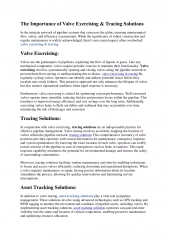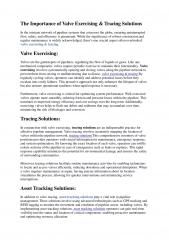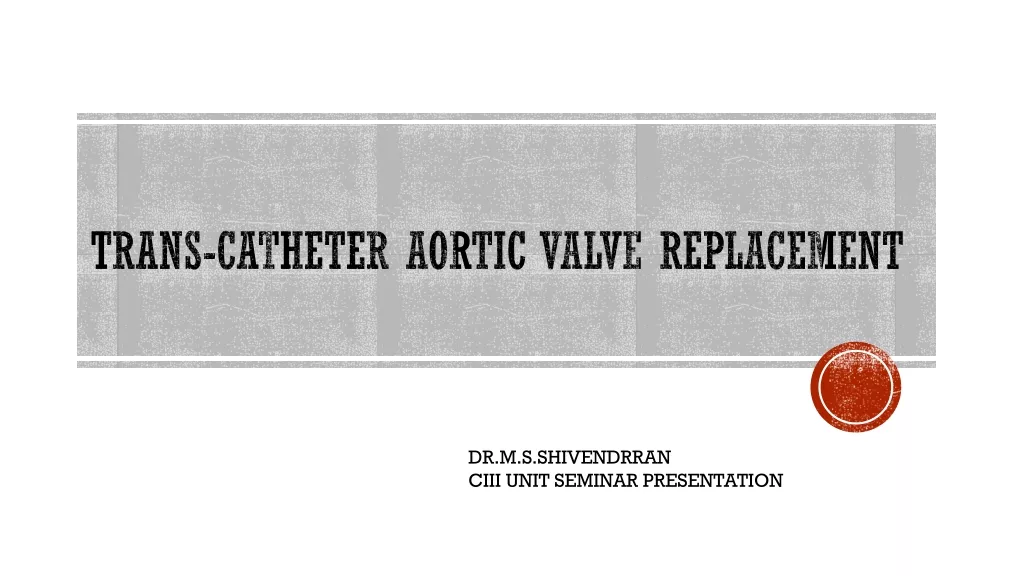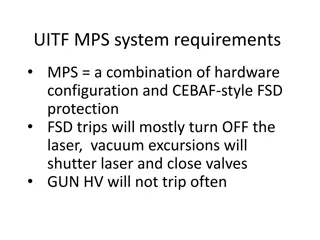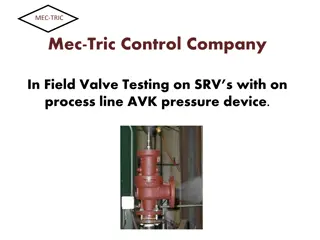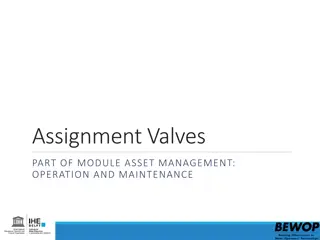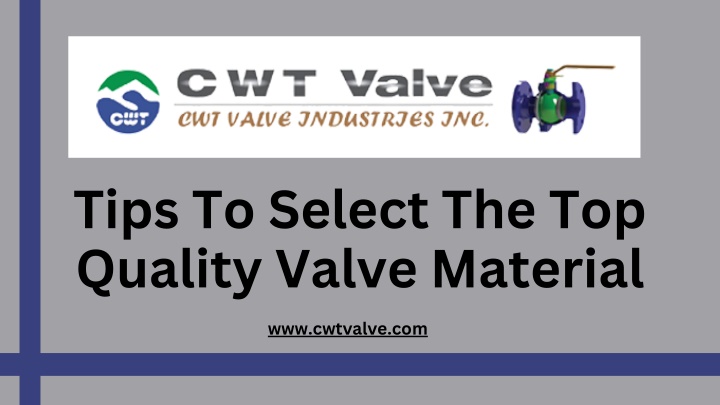
Tips To Select The Top Quality Valve Material
CWT Valve offers a top-quality range of industrial valves designed to meet diverse operational needs. Our product lineup includes durable and reliable valves made from premium materials, suitable for various applications across industries. We ensure
Download Presentation

Please find below an Image/Link to download the presentation.
The content on the website is provided AS IS for your information and personal use only. It may not be sold, licensed, or shared on other websites without obtaining consent from the author. If you encounter any issues during the download, it is possible that the publisher has removed the file from their server.
You are allowed to download the files provided on this website for personal or commercial use, subject to the condition that they are used lawfully. All files are the property of their respective owners.
The content on the website is provided AS IS for your information and personal use only. It may not be sold, licensed, or shared on other websites without obtaining consent from the author.
E N D
Presentation Transcript
Tips To Select The Top Quality Valve Material www.cwtvalve.com
Selecting the top-quality valve material is vital for ensuring the longevity, consistency, and performance of your valves. The material used in valve building affects its resistance to various working conditions, including temperature, pressure, and destructive environments. Here are key attentions and Valve Selection Guide for selecting the best valve material: 1. Understand the Operating Environment The operating environment suggestively influences the choice of valve material. Factors to consider include: Temperature Range:Temperature variation influences the performance of valves since high temperatures may deteriorate the valve materials while low temperatures may make the material rigid. In high temperature correlative field, some of the stainless or Inconel may be applied because the heat- resistant capacity. For cryogenic usage low temperature carbon steel or particular alloy materials should be used. Pressure: High pressure valves require materials which offer the necessary ability to resist stress. Casting alloys, having high tensile strength, or carbon steel are normally employed for high pressure valve. Corrosion and Erosion: Intensive and extreme environment conditions require the use of materials that are more resistant to corrosion; they include stainless steel, titannium or special alloys. For instance, in chemical processing industries there are valves that employ materials that offer less of a corrosive surface.
2. Types of Valve Materials Different materials offer distinct advantages and limitations: Stainless Steel: Highly respected on its corrosion resistant feature, this material is applied in food processing industries, pharmaceutical, petrochemical industries. There are even more standard versions such as 304L, 304HQ and also 316L, 316LN are the grade which provides moderate corrosion and heat resistant. Carbon Steel: Carbon steel is a cost-effective option for applications where corrosion resistance is less critical. It is often used in general industrial applications and where the valve will be exposed to lower temperatures and pressures.
Alloys: Special alloys such as Inconel, Hastelloy, and Monel are used for extreme conditions. These materials offer superior resistance to high temperatures, corrosive environments, and pressure. Plastic and Composite Materials: For applications where metal is not suitable, such as in highly corrosive environments or where weight reduction is important, plastic or composite materials like PVC, PTFE, or fiberglass-reinforced polymers can be used. These materials are lightweight and resistant to corrosion but may have limitations in temperature and pressure ratings.
3. Valve Design Considerations The design of the valve also impacts the Valve Material selection: Body and Trim Material: The valve body and trim (the internal parts that come into contact with the flow) should be made from materials that can handle the specific conditions of the application. For example, if a valve is used in a high-pressure steam application, the body and trim should be made from a material capable of withstanding high temperatures and pressures. Seals and Gaskets: The materials used for seals and gaskets should be compatible with the valve material and the process fluid. Materials like EPDM, Viton, or PTFE are commonly used for seals and gaskets depending on the fluid and temperature conditions.
4. Chemical Compatibility Ensure that the valve material is chemically compatible with the fluids or gases it will handle. Compatibility charts provided by manufacturers can help determine which materials are suitable for specific chemicals. For example, PTFE is known for its resistance to a wide range of chemicals, while some metals may corrode quickly when exposed to certain substances. 5. Standards and Certifications Check for relevant industry standards and certifications that ensure the valve material meets quality and performance requirements. Common standards include: ASTM (American Society for Testing and Materials): Provides standards for various materials used in valve construction. API (American Petroleum Institute): Sets standards for valves used in the oil and gas industry. ISO (International Organization for Standardization): Offers global standards for materials and manufacturing processes.
6. Manufacturers Expertise Choose Valve Body Materials from reputable manufacturers who offer detailed information about their materials and provide guarantees of quality. Reputable manufacturers often conduct rigorous testing and quality control to ensure that their valves meet industry standards and perform reliably in various conditions. 7. Cost vs. Performance Consider the balance between cost and performance. While high-quality materials may come with a higher initial cost, they often offer better performance, longevity, and reduced maintenance costs in the long run. Weigh the initial investment against the potential savings from reduced downtime and maintenance.
8. Maintenance and Service Life Evaluate the expected service life and maintenance requirements of the valve material. Some materials may require more frequent maintenance or replacement, while others are designed for longer service life with minimal upkeep. Choose a material that aligns with your maintenance capabilities and operational requirements. 9. Consult with Experts If in doubt, consult with valve experts or engineers who can provide guidance based on the specific requirements of your application. Their expertise can help you make an informed decision and ensure that you select the most suitable material for your valves.
CONTACT DETAILS PHONE : +1 403-8006686 EMAIL : info@cwtvalve.com ADDRESS : Calgary, AB, Canada T3A 5K8 WEBSITE : https://cwtvalve.com/ THANK YOU

